|
Third millennium BC
|
Bulgarian lands fall under the cultural dominance of the
Thracians, a Indo-European people, who lived in tribal society.
Thracians were famous for their horsemanships and were masters in metal working
with silver and gold. Many hoards were unearthed in present day Bulgaria at
sites such as Panagurishte,
Vulchi Trun
and Vratza.
Another essential feature of the Threcians was music.
Orpheus himself was an early Thracian king.
|
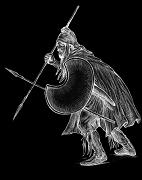
|
|
Fifth century DC
|
First Slav tribes settled in the Bulgarian lands. At the same time Proto-Bulgars,
a nomadic group of Turkic origin, invaded the Balkans. In 580 AD a group of
10,000 bulgars with their leader - Bulgarios were allowed to reside and settle
in the lands of today's Bulgaria. They came from the lands between Ural and
Volga and combined various ethnic elements. The name Bulgar means 'to mix'.
Proto-Bulgars had a formidable military reputation and a highly developed sense
of cohension and political organization.
|
|
Seventh century DC
|
The hoard
of Kuvrat(Kubrat) Khan of Great Bolgary.
|

|
|
681
|
A Bulgarian state appeared in the Balkans. Khan Asparuh established his capital
at Pliska near what is now Shumen.
|
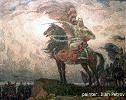
|
|
803-814
|
The reign of Khan Krum. In 811 he fortified Sredets, now Sofia, from the
Byzantines. After defeating Byzantine Emperor Nicephorus, Krum encrusted his
deceased skull in sylver and used it as a drinking goblet.
|
|
814-831
|
Khan Omurtag
|
|
851-888
|
The reign of Boris the First. His efforts to convert Bulgaria to Christianity
succeeded in 864. In 862 the ruler of Moravia requested an alphabet for his own
people. The work was done by two Salonica born monks, Ciril and Methodius.
|
|
893
|
Declaration of the Independent Bulgarian Church.
|
|
893-927
|
The reign of Simeon the Great represents the culmination of the First
Bulgarian Empire, 896-1018. After a long war with Byzantine empire, in 896 he
concluded a peace with the Greeks, who agreed to accept the independence of the
Bulgarian church. The capital was moved from Pliska to the nearby Preslav. In
Preslav Bulgarian art and literature did flower to unprecedented heights.
Simeon was surrounded with great men of letters like Monk Hrabr, John the
Exarch and Konstantin of Preslav.
|
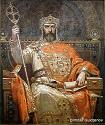
|
|
927-970
|
Tzar Petur.
Hermitism indicated a willingness to withdraw from the world and its problems.
The Bogomilism heresy assumed the entire visible world, including mankind, was
the creation of Satan; only the human soul was created by God who sent his son,
Christ, to show humanity the way to salvation.
|
|
997-1014
|
The reign of Tzar Samuil.
|
|
1018-1185
|
Bulgaria under the Byzantine rule.
|
|
1185
|
Petur and Asen, two landowners near Turnovo, took the leadership of the
uprising agains Byzantine and declared independent Bulgarian state.
|
|
1197-1207
|
The reign of Tzar Kaloyan.
|
|
1218-1241
|
Ivan Asen the Second took the second Bulgarian kingdom to its greatest height.
He moved the capital to Turnovo. During his reign one of the masterpieces of
the mediaeval Balkan art was created: the frescoes of
Boyana church near Sofia.
|

|
|
1323-1330
|
Tzar Mihail Shishman.
|
|
1331-1371
|
Ivan Alexander. In 1355 he commissioned the
four gospels which are now in the British museum.
|
|
1393
|
The capital Turnovo capitulated to the Turks. In 1396 Vidin, the last Bulgarian
stand, fall to the Ottomans. With this it began the five century Ottoman Empire rule
on Bulgarian lands.
|
|
...
|
...
|
Paisii Hilendarski
|
In eighteen century it began the process of Bulgarian national revival, so called vuzrazdane.
Paisii was one of the Bulgarians with great contribution to this process.
He was born in the town of Bansko in 1722. As a monk in the monastery of Hilendar on Mount Athos he wrote
his seminal work,
A Slavonic-Bulgarian History of the People, Tsars, Saints, and of all their Deeds,
and of the Bulgarian Way of Life.
|

|
Georgi Sava Rakovski
1821 - 1867
|
Rakovski was the first revolutionary activist who initiated a concerted
political action for the liberation of Bulgaria from the Turks. In 1867 he established the
Second Bulgarian Legion for armed strugle against the Turks. A more lasting
initiative of Rakovski was the Bulgarian Secret Central Committee (BSCC) founded in
1866, a sustained attempt to organize so called cheti or small armed groups
of dedicated revolutionaries.
|
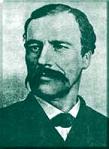
|
Luben Karavelov
1834 - 1879
|
A famous revolutionist, writer and journalist. Following Rakovski, Karavelov
believed that Otomman power could only be removed by revolution of the Balkan
Christians. He published numerous tracts, essays and novels.
|
|
Vasil Levski
1837 - 1873
|
The greatest Bulgarian national activist and martyr,
Vasil Levski was born on 18 July 1837 in Karlovo.
He became a leading member of Bulgarian Revolutionaly Central Committee (BRCC)
when it was established in 1870.
Levski's primary achievement was setting up a network of secret organizations in Bulgaria.
He often said: Bulgaria's liberation could be achieved only by the Bulgarians.
In 1872 he was betrayed by an accomplice and arrested. On 18 of Fabruary 1873 Levski was hanged in Sofia.
He was one written the now famous words:
"If I succeed, I shall succeed for the whole nation; If I fail, then I alone shall die."
|
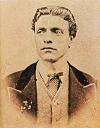
|
Hristo Botev
1848 - 1876
|
Bulgarian poet and national revolutionary, Botev was born in Kalofer, son of a
teacher. A widely known and admired for his writings, above all for his
poetry.
|
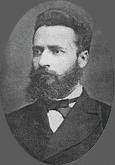
|








